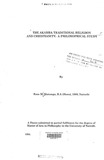| dc.description.abstract | Many philosophers and theologians alike have written on African religious heritage from different perspectives. However, it is apparent in their works that not much has been done on the philosophy behind the co-existence of the Akamba traditional religion and Christianity among the Akamba. In fact, most of the available works seem to have generalised on all Africans. This necessitates looking at such a co-existence of the two religions in this particular etlmic community. Therefore, this study is an inquiry into the basic principles underlying the co-existence of the Akamba traditional religion and Christianity.
An endeavour is made to look at the universal concept of God, and how it compares with the traditional Akamba concept of God. It ought to be remarked that the traditional Akamba concept of God is not different from the universal one. Indeed, the traditional Akamba ascribe to God the same attributes that are universally accorded Him. This is contrary to claims by some of the biased early anthropologists who ostensibly asserted that the traditional Akamba do not acknowledge God.
The relationship between religion and culture, with special reference to culture and world-view, and how culture influences worship of God is
critically analysed and evaluated. An important observation here is that culture
has an immeasurable influence over religion, so that people of different cultures find spiritual meaning and fulfilment through different belief systems and rituals of worship, In fact, culture seems to be the major principle underlying the co-existence of the Akamba traditional relizion and Christianity among the Akamba.
The study goes further and explicates the traditional Akamba worship of God. The various components that constitute the Akamba traditional religion are looked at; and their effect on the faith of the Akamba in their traditional religion evaluated. It is observed that the traditional Akamba are so
much attached to their culture that it is impossible for the majority of them to
completely denounce their traditional religion in favour of Christianity.
Finally, the study attempts a comparison between the Akamba traditional religion and Christianity. But emphasis is on those aspects that seem to be responsible for the fundamental differences between the two religions hence their point of departure.
This inquiry found that the two religions in question are 1\\-0 different modes of worship directed to the same God. They are aimed at achieving the same goal; that of establishing and maintaining a good relationship between the worshippers and God. It would perhaps be safer to conclude that as of
11m\', there seems to be no prospects that the traditional Akamba religion will
die soon as evidenced in this study that, the success of Christianity in Kambaland is superficial for the most part since many of supposedly practising and committed Christians hold the two religions in juxtaposition.
The study recommends that a better approach of educating the traditional Akamba on Christianity be adopted without necessarily having to sling mud at their religion and culture. Otherwise, the Christian approach has for the most part been one of being after triumphalism, conquest and victory over the Akarnba traditional religion. In a nutshell, this is what this thesis is all about | en |

